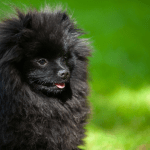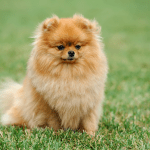White Pomeranian dogs boast fluffy, snow-white fur, coupled with endearing facial features like bright, almond-shaped eyes that are dark black in color. Who wouldn’t want to snuggle up to one of these precious cute puppies?
What is a White Pomeranian?
A White Pomeranian is a breed of Pomeranian dog that is known for its distinctive white coat color. The Pomeranian breed is known for being a small and energetic dog with a thick double coat that comes in a variety of colors, including white, black, brown, and cream.
White Pomeranians are highly sought after due to their stunning appearance and charming personality. They have a lively and friendly demeanor and are often described as playful and affectionate. As with all Pomeranians, white Pomeranians require regular grooming to maintain their luxurious coats, which can shed heavily at times.
It is important to note that while a white coat is highly prized in Pomeranians, it should not be the only factor considered when choosing a pet. It is essential to research the breed thoroughly and choose a reputable breeder or rescue organization to ensure that you are getting a healthy and well-socialized dog.
White Pomeranian Facts
- Pomeranians were originally bred in the province of Pomerania, which is now a portion of Germany and Poland.
- White Pomeranians are one of the most popular colors of the breed, along with black and orange.
- White Pomeranians have a dual coat, which consists of a cottony, dense undercoat and a longer, harsh outermost coat.
- Pomeranians are best known for being agile, lively, and watchful dogs.
- The average lifespan of a white Pomeranian is between 12-16 years.
Reasons Why Pure White Pomeranians Are Unique
Rarity
While white is an average color for many dog breeds, pure white Pomeranians are comparatively uncommon. They are highly sought after by dog lovers who value their impressive occurrence.
Distinctive appearance
The snow-white coat of a pure white Pomeranian is striking and eye-catching. It makes the dog stand out in a crowd and draws attention to its lovable features, like its dark, almond-shaped eyes.
Personality
Pure white Pomeranians, like all Pomeranians, are known for their lively and preceding personalities. They are social dogs that love to play and interact with their owners, making them beloved pets in many households.
Health
Some people consider that pure white Pomeranians are healthier than their colored counterparts. This is because they do not have any pigmentation in their fur, which can sometimes be related to health issues like allergies or skin sensitivities.
Grooming
Pure white Pomeranians require regular grooming to maintain their luxurious coats. This can be a time-consuming task, but for many owners, it is a labor of love that helps support their dog sensing and feeling its best.
2 Types of Pure White Pomeranians

Ice White Pomeranian
This type of white Pomeranian has a pure, snow-white coat without any other colors or markings. Their fur is often thick, fluffy, and long, which makes them look like little balls of cotton. They are highly sought after by dog lovers who consider their stunning appearance.
Cream Pomeranian
This type of Pomeranian has a slightly off-white or creamy-colored coat. Their fur is also normally fluffy and long, but they may have some darker shading on their muzzle, ears, or back. While not as pure white as Ice White Pomeranians, Cream Pomeranians are still highly desired and beloved pets.
Will A White Pomeranian Puppy Stay White?
No, it’s unachievable to guarantee that a white Pomeranian puppy will stay white throughout its whole life, as there are various factors that can influence the dog’s coat color.
While few Pomeranians are bred to have white coats, genetics can still play a role in deciding their coat color. For example, if a Pomeranian with a white coat has parents or grandparents with colored coats, there is a possibility that the puppy may inherit those genes and acquire a colored coat as they age.
Snow White Pomeranian Puppies Color Changes
Orange, Cream, White Parti Colors, and Light Orange very young Pomeranian puppies are oftentimes categorized as white baby Pomeranians.
The hair that is cream or biscuit down the ears of the puppy usually means that the white baby Pomeranian is a cream or a very light orange Pomeranian. However, it’s not a Pomeranian dissipated in an all-white coat.
A light biscuit-like spot on the coat of the puppy may be an indication that it’s a Pomeranian White puppy could be a part-colored Pomeranian and will not be an adult-white Pomeranian.
Are White Pomeranians Rare?
No, White Pomeranians are not considered rare within the Pomeranian breed. While several Pomeranian colors may be more popular than others, white is a relatively ordinary color for Pomeranians.
However, it’s worth noting that many breeders may charge more for white Pomeranians, especially if they have a pure white coat without any other colors or markings. This is because breeders may selectively breed Pomeranians with white coats to create more white puppies, which can be more challenging to come through than producing puppies with other coat colors.
How Much is a White Pomeranian Puppy?
The cost of a white Pomeranian puppy can differ depending on various factors, including the puppy’s lineage, age, location, and the honor of the breeder. On average, you can demand to pay anywhere from $500 to $5,000 for a white Pomeranian puppy.
Where To Buy a Fluffy White Pomeranian Puppy?
Reputable Breeders: One option is to find a reputable Pomeranian breeder who specializes in white or fluffy-coated Pomeranians. You can look up breeders online, ask for recommendations from other Pomeranian owners or breed clubs, and visit dog shows to come across breeders in person.
Rescue Organizations: Another choice is to check with Pomeranian rescue organizations in your area. These organizations frequently have Pomeranians of all ages and colors accessible for adoption, including white or fluffy-coated Pomeranians.
Pet Stores: Some pet stores may sell Pomeranian puppies, including white or fluffy-coated Pomeranians. Nevertheless, it’s essential to investigate the store and make sure they are respectable and do not source puppies from puppy mills or other dishonorable breeders.
Online Marketplaces: There are also online marketplaces where you can hunt for Pomeranian puppies for sale, such as PuppyFind, AKC Marketplace, or Hoobly.
Is Owning a White Pom Puppy Worth it?
It depends, the decision to own a white Pomeranian puppy should be based on your lifestyle, preferences, and capability to supply the necessity of the dog.
White Pomeranian Grooming

White Pomeranians have a thick, dual-layered coat that requires orderly grooming to keep its softness and preclude matting and tangling. It is necessary to safely keep your white Pomeranian healthy and comfortable. If you are uncertain about how to groom your Pomeranian, consult with a professional groomer or your veterinarian for advice.
White Puppy Pomeranian Care and Grooming
Taking care of and grooming a white Pomeranian can be very difficult, below we have listed all the ways you can do this to stay on top of it all.,
Brushing:
Brush your Pomeranian puppy’s coat at least once a day with a compressible bristle brush to take off loose debris, dirt, and fur. This will also help prevent the matting and tangling of the fur.
Bathing
Pomeranian puppies should be bathed every 4-6 weeks to keep their coat shiny and clean. Use a soft puppy shampoo and conditioner and wash thoroughly to prevent leaving any residue that could drive skin irritation.
Drying
After bathing or getting wet, use a towel or a blow dryer on a low-level setting to dry your Pomeranian puppy’s coat. Make sure to dry the coat exhaustively, particularly roughly the ears and feet, to forbid infections.
Trimming
Clean-cut the fur around your Pomeranian puppy’s feet, ears, and eyes on a regular basis to prevent matting and keep their appearance elegant and well-kept. You may also consider a full-body trim for easier care.
Dental Care
Begin dental care beforehand by regularly brushing your Pomeranian puppy’s teeth with a soft-bristled toothbrush and puppy toothpaste. This will help prevent dental trouble in the future.
Vaccinations and Preventive Care
Guarantee that your Pomeranian puppy is up to date on all their vaccinations and preventive care, including tick and flea hindrance and heartworm medication.
Exercise
Pomeranian puppies are progressive and require regular physical exercise to stay healthy and cheerful. This includes daily walks, playtime, and other activities to induce their mind and physical structure.
White Pomeranian Size
White Pomeranians are the identical size as other Pomeranians, disregarding their coat color. Pomeranians are a tiny breed of dog, typically weighing between 3 and 7 pounds (1.4 to 3.2 kg) and lasting about 6 to 7 inches (15 to 18 cm) tall at the shoulder. Nonetheless, there are some Pomeranians that are larger or smaller than the common size, and the size of various dogs can vary depending on components such as exercise, diet, and genetics.
White Pomeranian Health Problems
Luxating patella: This is a status where the kneecap dislocates or moves out of its natural position. It can cause lameness and limpness.
Dental problems: Pomeranians are prone to dental issues, such as tooth decay and gum illness. Orderly dental care, such as brushing your dog’s teeth, can help prevent these troubles.
Eye problems: Pomeranians can produce eye problems, including dry eye, progressive retinal atrophy, and cataracts. Regular eye tests with a veterinarian can help sight and treat these issues in advance.
Hypoglycemia: This is a term where the blood sugar level drops too low. It can cause seizures, weakness, lethargy, and even death. Little, young Pomeranians are particularly super sensitive to this condition.
Allergies: Pomeranians can be prone to an allergic reaction, which can cause hair loss, itching, and skin irritation.
White Pomeranian Temperament Insights

White Pomeranians, similar to other Pomeranians, are notable for their friendly and lively personalities. They are intelligent, energetic, and loyal dogs that love to be around people. Down below are some insights into the temperament of White Pomeranians:
Affectionate: Pomeranians are known for being caring with their owners and love to be petted and cuddled.
Alert: Pomeranians are very watchful dogs and make good guardian dogs. They will bark to inform their owners of any unusual sounds and intruders.
Playful: Pomeranians have an energetic and playful nature, and they love playing games and engaging in activities with their owners.
Independent: Disregarding their affectionate nature, Pomeranians can also be self-directed and will enjoy spending time alone.
Stubborn: Pomeranians can be stubborn at times and may be challenging to train without consistent and patient activity performing.
Social: Pomeranians are societal dogs and enjoy being around other dogs and people. Nevertheless, they may be on guard of strangers and may need socialization to help them feel comfy in new scenarios.
Breeding White Pomeranians
If you’re fascinated by learning to breed the snow-white Poms and you love the challenge of breeding the white Pomeranian is the breed for you.
A number of breeders have tried to breed show-quality white Pomeranian dogs. The only truly thriving white breeders have concentrated only specifically on white Pom. Many breeders, through the decades, have tested but given up on this task.
White-to-white breedings are inclined to cause problems such as Poms that have reversed back to the original or the primary Pomeranian kind losing pigmentation, deficiency of head and leg coats and unfortunate coat quality, and much more.
White Pomeranian Color Breeding Don’ts
I wouldn’t suggest breeding a white pom in conjunction with a chocolate sable or chocolaty Pomeranian. Don’t also breed White Pomeranians in collaboration with the orangish Pomeranian in the event of a possibility. Don’t combine an adult female white Pomeranian with the pom dog of a beaver.
History of The Pomeranian White Dog
The Pomeranian is a breed of dog that was initiated in the region of Pomerania, which is now part of Germany and Poland. The breed is named after the region, and it is considered to have ascended from larger Spitz-type dogs.
The Pomeranian was first acknowledged as a well-defined breed in the late 19th century, and it quickly became popular with royalty and the superior classes. Queen Victoria of England was a known Pomeranian enthusiast, and she is attributed with serving to popularize the breed in England.
The Pomeranian has gone through respective changes in appearance over the years. In the early 20th century, the breed was bigger and weighed up to 30 pounds. However, breeders began to selectively breed little Pomeranians, and the modern breed now weighs between 3 and 7 pounds.





